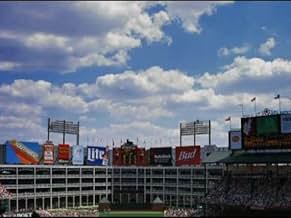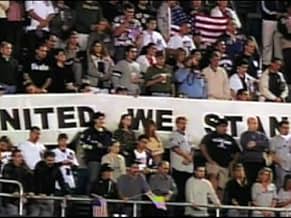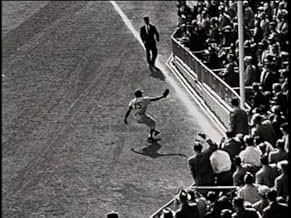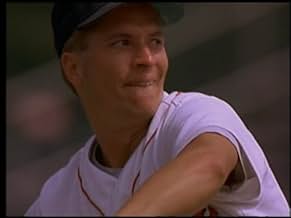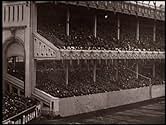Ajouter une intrigue dans votre langueA documentary on the history of the sport with major topics including Afro-American players, player/team owner relations and the resilience of the game.A documentary on the history of the sport with major topics including Afro-American players, player/team owner relations and the resilience of the game.A documentary on the history of the sport with major topics including Afro-American players, player/team owner relations and the resilience of the game.
- Récompensé par 1 Primetime Emmy
- 3 victoires et 5 nominations au total
Avis à la une
Inning 1 (Our Game) - 1840s-1900. This segment reveals some facts probably 98 percent of all fans don't know, such as Abner Doubleday did NOT invent the game baseball, that it slowly evolved from a combination of rounders and cricket.
Inning 2 (Something Like A War) - 1900-1910. This might have been the most interesting tape (or disc) featuring incredible stories of riots on the field, in the stands, a stadium and 13 adjacent building all catching fire, one wild story after another. It's the era of the most hated player in the history of the game: Ty Cobb.
Inning 3 (The Faith Of 50 Million People) - 1910-1920. Almost as good as the previous decade. this was a time when America went absolutely batty over baseball. The players were the toughest they have ever been, playing for horrible wages where the game was "life and death" for many. The last half hour centers on the famous Black Sox Scandal.
Inning 4 (A National Heirloom) 1920-1930. This tape centers primarily on Babe Ruth, but who's complaining? Ruth was arguably the greatest player the game has ever known because he could pitch and well as he could hit and was an extremely colorful personality.
Inning 5 (Shadow Ball) 1930-1940. This segment revolves around the beginnings of the Negro Leagues as perhaps the game's greatest pitcher ever: Leory "Satchel" Paige.
Inning 6 (The National Pastime) 1940-1950. Baseball was now open to all people as Jackie Robinson breaks the color barrier. Being Liberal-bias, Burns went overboard on this - and similar topics throughout the series - but Robinson's entry, nonetheless, was the biggest change in the history of the sport and he was an incredible man.
Innning 7 (The Capital Of Baseball) - 1950-1960. This tape is definitely for New York City area fans, but the rest of us can enjoy a lot of this, too. The Yankees, Dodgers and Giants all dominated in this decade.
Inning 8 (A Whole New Ballgame) - 1960-1970. Being a decade of social upheaval, riots, assassinations, etc., this centers on the effect on baseball and with the big change in owner-player relations with the players hiring Marvin Miller, a labor lawyer, to represent them.
Inning 9 (Home) - 1970-time of film release. This is potpourri of items from Earl Weaver and the Orioles to Willie Stargell and the Pirates and The Big Red Machine, the Red Sox horrible defeat in the 1986 World Series, among other things.
It would be interesting to see this updated and revised to include the strike in the mid '90s, the home run record-breakers and subsequent steroids scandal and, yes, the Red Sox finally winning it all.
Unfortunately, there is one major flaw: the obsession with Boston and (especially) New York. While in some sense this is forgivable - highlighting these cities added some structure and continuity to the narrative, in others, it was blatant favoritism. For example, episode 7 is called "The Capital of Baseball", which can be seen as referring to many things metaphorically, but most directly, to New York City. To put things in perspective, the New York Yankees won the World Series in 1947, 1949, 1950, 1951, 1952, 1953, 1956, 1958, 1961, and 1962. When, in 1960, Bill Mazeroski hit a dramatic home run in the 9th inning of game 7 to win the World Series for the long-suffering Pittsburgh Pirates, the focus was not on the joy of Pittsburgh (or the rest of the country) in seeing the mighty Yankees / New York Teams finally tamed. No, the focus was on the shock and sadness felt by Yankees fans and players. We get to hear comedian Billy Crystal tell us how crushed he felt, despite the previous Yankee championships and even though we see from other segments with him that he seemed to change his allegiances from Yankees to (Brooklyn) Dodgers to Mets as the winds blew. Sorry if I have a hard time sympathizing.
It also stands to note that while doubtlessly others will nitpick here and there about things that have been left out of Burns' telling, none stands out more than the omission of the 1980 National League Championship Series between the Phillies and Astros, which unquestionably ranks as the best playoff series ever played between two teams in the history of baseball. But, no, that's left out and instead you get another 10 minute story about New York instead.
Still, don't let my comments distract from the overall greatness of this series. Highly, highly recommended.
Le saviez-vous
- AnecdotesIronically, first aired in the fall of 1994 when much of the season and the World Series were cancelled due to a strike. This made it the only "baseball" available to millions of unhappy fans at what should have been the most exciting time of the season.
- Citations
Narrator: It is played everywhere. In parks and playgrounds and prison yards. In back alleys and farmers' fields. By small children and old men. Raw amateurs and millionaire professionals. It is a leisurely game that demands blinding speed. The only game in which the defense has the ball. It follows the seasons, beginning each year with the fond expectancy of springtime, and ending with the hard facts of autumn. It is a haunted game, in which every player is measured against the ghosts of all who have gone before. Most of all, it is about time and timelessness. Speed and grace. Failure and loss. Imperishable hope. And coming home.
- ConnexionsFeatured in WatchMojo: Top 10 Documentary Mini Series (2015)
Meilleurs choix
- How many seasons does Baseball have?Alimenté par Alexa
Détails
- Durée
- 1h 44min(104 min)
- Couleur
- Mixage
- Rapport de forme
- 16:9 HD
- 4:3



